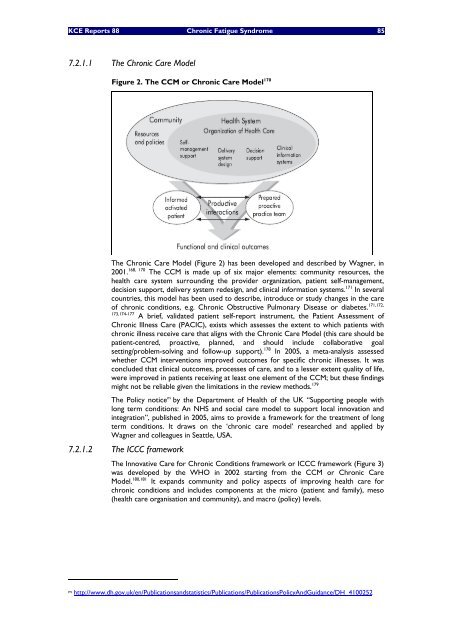Chronisch Vermoeidheidssyndroom: diagnose, behandeling en ...
Chronisch Vermoeidheidssyndroom: diagnose, behandeling en ...
Chronisch Vermoeidheidssyndroom: diagnose, behandeling en ...
You also want an ePaper? Increase the reach of your titles
YUMPU automatically turns print PDFs into web optimized ePapers that Google loves.
KCE Reports 88 Chronic Fatigue Syndrome 85<br />
7.2.1.1 The Chronic Care Model<br />
Figure 2. The CCM or Chronic Care Model 170<br />
The Chronic Care Model (Figure 2) has be<strong>en</strong> developed and described by Wagner, in<br />
2001. 168, 170 The CCM is made up of six major elem<strong>en</strong>ts: community resources, the<br />
health care system surrounding the provider organization, pati<strong>en</strong>t self-managem<strong>en</strong>t,<br />
decision support, delivery system redesign, and clinical information systems. 171 In several<br />
countries, this model has be<strong>en</strong> used to describe, introduce or study changes in the care<br />
of chronic conditions, e.g. Chronic Obstructive Pulmonary Disease or diabetes. 171,172,<br />
173,174-177<br />
A brief, validated pati<strong>en</strong>t self-report instrum<strong>en</strong>t, the Pati<strong>en</strong>t Assessm<strong>en</strong>t of<br />
Chronic Illness Care (PACIC), exists which assesses the ext<strong>en</strong>t to which pati<strong>en</strong>ts with<br />
chronic illness receive care that aligns with the Chronic Care Model (this care should be<br />
pati<strong>en</strong>t-c<strong>en</strong>tred, proactive, planned, and should include collaborative goal<br />
setting/problem-solving and follow-up support). 178 In 2005, a meta-analysis assessed<br />
whether CCM interv<strong>en</strong>tions improved outcomes for specific chronic illnesses. It was<br />
concluded that clinical outcomes, processes of care, and to a lesser ext<strong>en</strong>t quality of life,<br />
were improved in pati<strong>en</strong>ts receiving at least one elem<strong>en</strong>t of the CCM; but these findings<br />
might not be reliable giv<strong>en</strong> the limitations in the review methods. 179<br />
The Policy notice m 7.2.1.2<br />
by the Departm<strong>en</strong>t of Health of the UK “Supporting people with<br />
long term conditions: An NHS and social care model to support local innovation and<br />
integration”, published in 2005, aims to provide a framework for the treatm<strong>en</strong>t of long<br />
term conditions. It draws on the ‘chronic care model’ researched and applied by<br />
Wagner and colleagues in Seattle, USA.<br />
The ICCC framework<br />
The Innovative Care for Chronic Conditions framework or ICCC framework (Figure 3)<br />
was developed by the WHO in 2002 starting from the CCM or Chronic Care<br />
Model. 180,181 It expands community and policy aspects of improving health care for<br />
chronic conditions and includes compon<strong>en</strong>ts at the micro (pati<strong>en</strong>t and family), meso<br />
(health care organisation and community), and macro (policy) levels.<br />
m http://www.dh.gov.uk/<strong>en</strong>/Publicationsandstatistics/Publications/PublicationsPolicyAndGuidance/DH_4100252

















